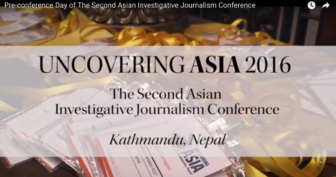Investigative journalist Ramu Sapkota wanted to expose the problem of medical negligence in Nepal, so he set off on a quest to gather evidence.

The documents he collected helped the Himal Khabarpatrika correspondent tell the story of understaffed and ill-equipped medical colleges, which had mushroomed across the tiny Himalayan nation, producing under-qualified doctors and putting millions of citizens at risk.
Sapkota’s story is one example of the potential of investigative journalism to expose abuse, corruption and ineptitude in an industry that directly impacts public well-being. Sapkota described his enterprising approach to health reporting at the Uncovering Asia 2016 conference in Kathmandu.
After gathering documentation, Sapkota went undercover, posing as an agent who could bring Indian students to the private medical colleges he canvassed.
At the privately-owned Universal Medical College in the city of Bhairahawa, Sapkota secretly recorded a conversation with an official, which he used as evidence of collusion between bureaucrats at medical councils and universities, Supreme Court judges, lawmakers and private colleges.
“The sting operation happened at the last stage of the investigation,” Sapkota said on a panel on investigating health. “The only reason I did the sting operation was when I had clear proof that the medical institution was doing malpractice. I had to do the sting because the public needed to be convinced about the malpractice.”
The panel on health reporting focused on the role journalists can play in combating deeply entrenched corruption in their countries and ensuring more accountability. But the investigative work can come at the expense of personal safety, Sapkota noted, adding that he has taken extra physical precautions since going undercover.
He also warned journalists against conducting a sting operation without first researching their subjects well and gathering clear evidence. “I advise no journalist to do sting operations if their paper trail is not covered,” he said.
 Surbhi Kaul is a Delhi-based journalist involved with the Centre for Investigative Journalism, India’s first organisation dedicated to supporting and strengthening in-depth and watchdog journalism.
Surbhi Kaul is a Delhi-based journalist involved with the Centre for Investigative Journalism, India’s first organisation dedicated to supporting and strengthening in-depth and watchdog journalism.
